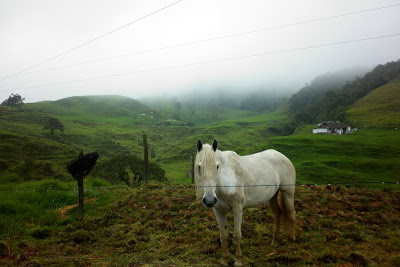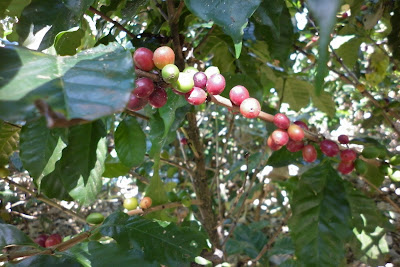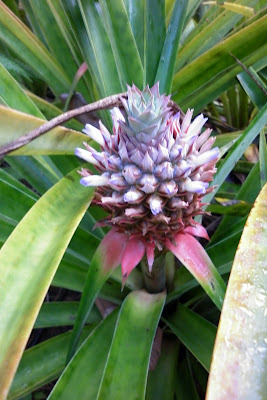The rolling hills of northern Colombia lent into the sun. A sweltering heat rose from the ground and beat down from the sky. Buffaloes wallowed in mud to their shoulders, and the trunks of trees stood always surrounded by a closely bunched herd of cows, the intermittent shadows of leaves dappled on their hides. People dipped only momentarily into the yellow heat; the darkened angular shade always crowded, the people still as cows. Even the hammocks failed to swing, slumped and exhausted, under a hot and heavy weight.
I hadn´t cycled for almost two weeks and the activities I´d replaced the exercise with, namely drinking too much and sleeping too little, meant that on more than one occasion I had the sensation of fainting as I collapsed into the shade or sat down to drink water.
Small wooden shacks lined a dusty roadside, counters piled high with fruit: oranges and pineapples; passion fruit, guavas and tree tomatoes. Cafes served an abundance of food better suited to the frigid climate of the highlands: mountains of rice; beans and potatoes; slabs of meat and legs of chicken; deep fried empanadas and deep fried bread. Hot steam and hot smoke under the hot roofs rose.
I was tired when I reached San Juan Nepomuceno. Too tired to ask coherently about a place to sleep, and much too tired to pronounce the town´s name properly. Coherency and cultural awareness though are not always so important, and I was soon led to a residencia, and it´s crumbling concrete walls.
An iguana swaggered slowly across the yard. Hens scratched in the dust and dried leaves, leading always behind them a trail of young. And humming birds hovered; blurred wings against sky, and a falling sun.
Inside a moth beat itself against a dirty white wall, and did do so `til it died, exhausted, on a grey and dusty floor.
Hello. My name is Sam and I'm trying to cycle round the world to raise money for Shelterbox. If you want to donate or find out more about the charity that would be brilliant. Just click on the links below.
Wednesday, 9 February 2011
Costa Rica
Lightly, the patter of rain begins; dimples and small splashes on the thick brown water. From the river the crashing of waves can be heard. A grey bank of clouds on the horizon, above the sea. The glow of a burning sun, barely perceptible through a grey and tearful mist.
Mangroves dip moist hands, unseen, beneath the murky depths. Barnacles cling to them. Sometimes scratching the undersides of kayaks. Along them scurry hermit crabs. Beady black eyes like demented puppets staring out of shells. Far away, a howler monkey calls.
The rain falls, ever heavier now, and the ruptured water sings. Tiny explosions on the surface at first, and then full soaking sheets, gushing from all sides. A heron takes flight. To shelter.
I am as wet as I think you can get, so I carry on; past the gentle curves and banks of sand, the full and bustling trees.
The darkened sky flashes, a sheet of electric blue. And then, not a crack of thunder far away, but a noise that swallows me, a sky that´s full of sound.
Then. As the raindrops lose force, and thin strands of sunlight find water to make shine, something happens. I see something I have never seen before. Perhaps will never see again. But I know exactly what it is. It is a Basilisk. A Jesus Christ lizard.
I saw a picture of one once in a National Geographic I was vandalising for a geography coursework on rainforests. I remember the fragile drops of water, caught like frozen glass in the air. And the feet stretched wide, lightly catching the river´s surface, muscles taut and a body bursting with speed, even in the motionless shot. A blurry green background, and each succesive step, miraculously made.
In real life you don´t see any of these things. Just a very fast lizard running across a stream, quite impossibly, before your eyes. No individual movement discernible from the next.
During the holiday in Costa Rica with my dad we saw many incredible species of animals and plants, but I don´t think I will ever forget the first time I saw a lizard walk on water.

Mangroves dip moist hands, unseen, beneath the murky depths. Barnacles cling to them. Sometimes scratching the undersides of kayaks. Along them scurry hermit crabs. Beady black eyes like demented puppets staring out of shells. Far away, a howler monkey calls.
The rain falls, ever heavier now, and the ruptured water sings. Tiny explosions on the surface at first, and then full soaking sheets, gushing from all sides. A heron takes flight. To shelter.
I am as wet as I think you can get, so I carry on; past the gentle curves and banks of sand, the full and bustling trees.
The darkened sky flashes, a sheet of electric blue. And then, not a crack of thunder far away, but a noise that swallows me, a sky that´s full of sound.
Then. As the raindrops lose force, and thin strands of sunlight find water to make shine, something happens. I see something I have never seen before. Perhaps will never see again. But I know exactly what it is. It is a Basilisk. A Jesus Christ lizard.
I saw a picture of one once in a National Geographic I was vandalising for a geography coursework on rainforests. I remember the fragile drops of water, caught like frozen glass in the air. And the feet stretched wide, lightly catching the river´s surface, muscles taut and a body bursting with speed, even in the motionless shot. A blurry green background, and each succesive step, miraculously made.
In real life you don´t see any of these things. Just a very fast lizard running across a stream, quite impossibly, before your eyes. No individual movement discernible from the next.
During the holiday in Costa Rica with my dad we saw many incredible species of animals and plants, but I don´t think I will ever forget the first time I saw a lizard walk on water.

A day in Nicaragua
In the morning, mosquitos; slow and heavy with my blood.
Dusty the yellow, sun lit shafts, and thin; small light cracks around a heavy door.
In the morning, one half-opened eye, a £2 bottle of rum, half-empty, and a concrete floor, scattered mess and a bike to ride.
In the morning, revenge; red, mosquito-sized blotches on hot, wet skin. The scrunching of them. The tearing of wings.
Cold, waking water in the morning´s heat.
Later, under the midday sun, a horse lies, dead. On one side, smooth, bare ribs stick out towards the sky, the shrivelled black heads of vultures jostling for meat. Wings flare up and two pairs of talons grapple and scratch. There is half a horse left, but already, reason to fight. The horse´s head turns away, nonchalant, as though uninterested by the score of vultures feasting on its flesh. Or perhaps its neck is broken.
Behind the vultures green grass glistens, wet, and in the distance the faded silhouette of a volcano, a smoky dark blue. I stop for lunch at a wooden shack, a single stove connected to a gas canister. Chicken, rice and beans.
The fields dissolve into the dust and noise of a city; the market places and three-lane streets, new glass buildings and shining cars. A public park is covered in make-shift shelters; corrugated iron sheets, branches of trees and black plastic bags stretched taut. The structures are packed so tightly, there is barely enough room for a person to walk between them. There are no doors built into the shelters, but inhabitants of the settlement come and go, through the gaps in plastic-bag walls.
I cycle through Managua, the capital city of Nicaragua, home to a third of the country´s population, in less than 2 hours. The dust and noise dissolve into fields once again.
The shadows lengthen, fade and disappear. Only a faint glow remains above the western horizon. On the outskirts of Masaya, I stop and ask for directions.
There is a stable outside Bisma´s house. Two horses chewing straw. Dogs in the yard. Machinery lies everywhere. The truck that Bisma drove from Los Angeles to Nicaragua several years ago is parked beside two others, and outside the gate another pulls up. The working day comes to an end.
Cold beers appear from inside, and we sit outside on rocking chairs. Errands are ran; more cigarettes, more beer, and it is late before the cycle ends. We drive in Bisma´s car down to the town, and are welcomed into José´s house. As we step inside, Bisma turns to me, "This is Nicaragua."
Nicaragua then, is the thick rich scent of sizzling pork, and the sweet shiver of golden rum, the crispy salty taste of fried plantains, and a lightly spiced rice. It is a room full of people at midnight, music blaring from the street, and from inside. Children dropping bikes outside and running inside to drink juice, eat plantain crisps, and running out again to play. It is a great closeness between people, and an openness and generosity towards strangers. It is a beautiful, warm evening, at the end of a long hot day.
We are the last to leave, full and drunk; the streets are quiet, and the darkness cool.
"Come back tomorrow, stay for a few days," says José, showing us out.
I can´t, I tell him. I´m meeting my dad in Costa Rica. It´s a conversation we had only an hour or so ago.
"Ahh, Costa Rica. Tell your dad to come here. He would be very welcome."

Playa Hermosa, Nicoya Peninsular, Costa Rica
Dusty the yellow, sun lit shafts, and thin; small light cracks around a heavy door.
In the morning, one half-opened eye, a £2 bottle of rum, half-empty, and a concrete floor, scattered mess and a bike to ride.
In the morning, revenge; red, mosquito-sized blotches on hot, wet skin. The scrunching of them. The tearing of wings.
Cold, waking water in the morning´s heat.
Later, under the midday sun, a horse lies, dead. On one side, smooth, bare ribs stick out towards the sky, the shrivelled black heads of vultures jostling for meat. Wings flare up and two pairs of talons grapple and scratch. There is half a horse left, but already, reason to fight. The horse´s head turns away, nonchalant, as though uninterested by the score of vultures feasting on its flesh. Or perhaps its neck is broken.
Behind the vultures green grass glistens, wet, and in the distance the faded silhouette of a volcano, a smoky dark blue. I stop for lunch at a wooden shack, a single stove connected to a gas canister. Chicken, rice and beans.
The fields dissolve into the dust and noise of a city; the market places and three-lane streets, new glass buildings and shining cars. A public park is covered in make-shift shelters; corrugated iron sheets, branches of trees and black plastic bags stretched taut. The structures are packed so tightly, there is barely enough room for a person to walk between them. There are no doors built into the shelters, but inhabitants of the settlement come and go, through the gaps in plastic-bag walls.
I cycle through Managua, the capital city of Nicaragua, home to a third of the country´s population, in less than 2 hours. The dust and noise dissolve into fields once again.
The shadows lengthen, fade and disappear. Only a faint glow remains above the western horizon. On the outskirts of Masaya, I stop and ask for directions.
There is a stable outside Bisma´s house. Two horses chewing straw. Dogs in the yard. Machinery lies everywhere. The truck that Bisma drove from Los Angeles to Nicaragua several years ago is parked beside two others, and outside the gate another pulls up. The working day comes to an end.
Cold beers appear from inside, and we sit outside on rocking chairs. Errands are ran; more cigarettes, more beer, and it is late before the cycle ends. We drive in Bisma´s car down to the town, and are welcomed into José´s house. As we step inside, Bisma turns to me, "This is Nicaragua."
Nicaragua then, is the thick rich scent of sizzling pork, and the sweet shiver of golden rum, the crispy salty taste of fried plantains, and a lightly spiced rice. It is a room full of people at midnight, music blaring from the street, and from inside. Children dropping bikes outside and running inside to drink juice, eat plantain crisps, and running out again to play. It is a great closeness between people, and an openness and generosity towards strangers. It is a beautiful, warm evening, at the end of a long hot day.
We are the last to leave, full and drunk; the streets are quiet, and the darkness cool.
"Come back tomorrow, stay for a few days," says José, showing us out.
I can´t, I tell him. I´m meeting my dad in Costa Rica. It´s a conversation we had only an hour or so ago.
"Ahh, Costa Rica. Tell your dad to come here. He would be very welcome."

Playa Hermosa, Nicoya Peninsular, Costa Rica
Subscribe to:
Comments (Atom)















































